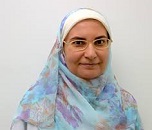
Enas Attia
Queen Medical Center, Qatar
Biography
The frequency and severity of atopic disease is increasing in Qatar. We have aimed to determine characteristics of patients with severe forms of atopic asthma, rhinoconjunctivitis and atopic dermatitis in adult Qatari and non-Qatari residents who presented at Queen Medical Center, Doha from January 2015 to May 2016. A total of 31 adult patients (11 males) with severe atopic conditions attended outpatient clinics and ER during the defined period. Among the patients, 5 (16.1%) were Qatari and 26 (83.9%) were non-Qatari [11 (35.5%) Arabs, 7 (22.6%) Caucasians, 7 (22.6%) Asians and 1 (3.2%) African]. A family history of atopy was present in 17 (54.8%) patients with asthma the most common conditions reported (in 12 patients; 38.7%). Severe asthma was diagnosed in 14 (45.2%) patients, severe rhinoconjuctivitis in 11 (35.5%) and severe atopic eczema in 6 (19.6%). Overall, 21 (67.7%) patients had one severe atopic condition while 10 (32.3%) had other atopic manifestations as well with severe rhinoconjuctivitis commonly associated with asthma. Only three of the patients surveyed had all three of these atopic conditions. Eight patients (25.8%) reported that the condition had an onset or worsening in adulthood; in seven of them, it was coincident with residency in Qatar; possibly related to the local environment or climate. Generally, dust was mentioned as the most common trigger factor, followed by pollens and grass, strong smells and animal dander. Patients with severe atopic dermatitis were likely to have allergies other than classic atopy; penicillin allergy, food allergy and contact dermatitis (each reported in 2 patients). Our findings indicate that severe atopic disease is an important public health problem in Qatar. There will be a need for improvement in prevention and management plans.
Abstract
Abstract : Severe atopy in adult patients: Single center study in Qat

